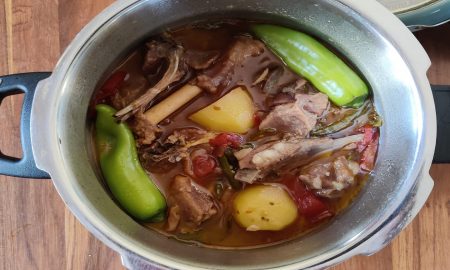
Things were moving too slowly. By September, there ought at least to have been a back and a front. Sprouts of sleeves. But her mother had only made it to the armpits. A sweater she decided to work in the round that year.
Maggie came home to find her mother asleep in the recliner. She let her bag drop heavily to the floor. The alarm on her mother’s watch chimed but it took a long time for her hand to emerge and tap it off. She never seemed fully awake these days, as though she couldn’t crawl out from under that sheet of sleep.
“How was school?” Her mother began winding the yarn toward her. It ended abruptly, wet and frizzy. “Dammit, Mr. Socks.” She kicked out a foot, but the cat was gone. Having successfully slaughtered the snake of yarn and batted the rest of the skein under the couch, he was probably hiding under the calla lily by the birdfeeder. “Get that for me, would you, Mags?”
Maggie walked out of the kitchen eating a carrot, the most depressing thing she could find. “There’s no snack,” she said and cracked into it. “Again.” She knelt by the couch and fished out the yarn-ball. Grey-blue. “Slate” her mother had told her. Maggie’s new favorite color.
“Indeed.” After stabbing the ball of yarn with her needles, Maggie’s mother pushed up from the chair. She rummaged in the pantry. Cans fell to the floor with a dull thud.
Maggie took her place at the table and opened her geometry book. Dutiful. It was a word from English class, from some old book they were reading about “dutiful daughters.” She’d show her mother what dutiful looked like.
Karen slid onto the long bench. She deposited the jar of marshmallow cream, bag of chocolate chips, and two spoons by Maggie’s open book. After they gorged on spoons dipped in marshmallow dipped in chocolate chips, Karen sighed. “Now that’s what I call a snack.” She pulled Maggie’s open geometry book toward her. “Looks like word problems,” she said. “Need some help?” Maggie’d finished that part of the assignment already, but she tucked the sheet in the back fold of her book and let her mother help her through it all over again.
***
When the sweater was no nearer completion some weeks later, real worry set in. It wasn’t that she wanted to have it in time for something – her mother’s sweaters were only worn at home, on weekends (she dreaded the thought of the looks she’d get at school). Rather, Maggie worried that if it took too much longer, it wouldn’t fit anymore. And how she loved that color! Already, the shirts she’d worn through summer had grown tight over her chest, and her mother had measured her in the summer, calling her over from dashing through the sprinkler to slip her sewer’s tape measure around her chest and waist, re-measure from shoulder to belly while Maggie shivered in the shade.
After dinner, Maggie slid onto the end of the couch nearest her mother’s chair. Might as well be her bed. Karen dozed, her purplish eyelids fluttering down until jolted by noise from the TV. Maggie pulled out the basket of knitting and lifted out the sweater. The stems of two sleeves had appeared off the sides. She fanned it around until the chill stir of wind woke her mother.
“Want to work on it?” Maggie asked.
“Oh, love,” her mother said. “I feel so tired.”
“Margaret. Let your mother rest.” Her father’s voice came from the other room, the formal dining room with the large table covered in stacks of mail. His fingers tapped a cadence across the calculator as he examined a paper and moved it from the left side to the right, occasionally swearing.
“No, no,” Karen said, sitting up. “It’s ok. I should work on it.” She took the needles, worked a few stitches, and then her face brightened. She scooched into a corner of her chair and patted the cushion.
Maggie was too big to sit in the chair with her mother. They both knew that. But she squeezed in anyway and tried not to notice how close her mother’s bones had grown to her skin. It all had something to do with the counter in her parent’s bathroom, that sea of amber pill bottles, the alarms on her mother’s watch, the half-empty water glasses all over the house.
Her mother held the needles up. “See? This is how you hold them.” She placed the tip of the right needle over the first loop on the left one, maneuvered it through, brought the yarn around, then swish-clicked – and there was one more loop on the right side, one less on the left. She demonstrated again.
All her life, Maggie had watched her mother knit, watched the different stitches as her mother made hats and scarves and knuckle-gloves and skirts. And every year, a sweater for Maggie. Maggie felt she knew already how to knit, but when her mother transferred the needles to Maggie’s hands, they suddenly seemed a puzzle. Tools of an unknowable trade. Half a dozen stitches fell off, the naked loops an accusation.
“Oops!” Her mother took back the needles and returned the stitches to their place. “That’s ok. See? Easy fix.” She was always laughing over her mistakes. Everything can be fixed, she’d say, and if not? Just act like you always meant to do that. And then go find some decorative buttons.
The stitches back on, Karen tried to hand them over again, but Maggie stuck her fingers under her legs. “I can’t.”
“Sure, you can! It’s easy.”
“No. I can’t.” She began to push herself out. Karen held her arm until Maggie jerked it away. “I said I can’t!”
“Maggie!” Her father stood in the doorway. “Go to your room.”
She went.
***
Over the next many weeks, into November and half of December, this became the argument that defines her girlhood, that year before she became a teenager. Her mother insisting she learn to knit. Maggie refusing. Neither of them knew which propelled which. Was it her mother’s insistence that made Maggie refuse? Or Maggie’s refusal that made her mother insist? Maggie couldn’t name the thing she felt – that would come much, much later – but she only knew that knitting belonged to her mother in the same way that the sweaters her mother made belonged to her.
The fights about knitting seemed to be the only thing her mother woke up for. Her father didn’t know what to do. Half the time he begged Maggie to knit. Half the time for Karen to let the girl be.
And then.
Maggie finished the dishes and gathered her books to take to her room. She no longer sat with her parents in the evening for an hour of TV. She finished her homework in her room and then read, sometimes her mother slipping into bed beside her to read aloud, a tacit neutral zone. Maggie often fell asleep with the light on, but it was always off by morning.
“Margaret?” Her mother’s voice was thin. Sharp. “Sit down.”
Maggie sat. Her mother pulled out her knitting from under the side table. Maggie groaned and stood.
“Sit.”
She sat.
Karen grabbed each of Maggie’s hands and forced them around the needles. She held them tightly. Painfully.
“You’re hurting me,” Maggie said. And she was hurting. Each stitch a stab.
Her father sat forward. “Kar,” he began.
“No,” she said to him. “She has to learn to do this.” Then, to Maggie, “stop it!” She shook Maggie’s hands and gripped them tighter. “Now do it. I know you can do it.”
Maggie whimpered. Finally, she jerked away and stood. She massaged her aching fingers. “I don’t want to.”
Her mother stood too, a slow but determined rise. Maggie hadn’t realized how much her mother looked like a bird these days, all shrunken around her shoulder blades, her head thrust forward on a thin neck. But the voice that came from her throat was not one Maggie had ever heard before. “You will sit down and knit, goddammit!” She grabbed Maggie’s arms.
Maggie felt the bruises blossom, little pops under each of her mother’s fingers. She tried to pull away but her mother’s frail look belied her strength. She began to cry in earnest.
“Knit!” her mother screamed in her face. “Knit! Knit!”
It was her father who pulled them apart. “Karen! Jesus, that’s enough.”
Maggie found her voice again and screamed back. “Why?” she demanded. And then she said the thing everyone had known but no one would say. “What? Like you’re going to die or something?”
Her mother sank back onto the couch, again a weak and too-tired woman. She picked up the slate yarn and fingered the strand. “Yes,” her mother said in a voice almost lost below the tinny swish of the needles.
And it was in the silence that followed. In her father’s eyes fixed on a corner of the carpet. In the furious clicking of her mother’s needles, that Maggie knew it was true.
The next morning Maggie came out of her room in a t-shirt so her mother would see her arms, the purple smudges like so many embedded buttons. Then, she pulled on the sweater from last year, the sleeves halfway up her forearms, the bottom hem inches above her waist, and wore it to school.
***
You’d think the last thing Maggie’d remember about her mother would be the woman lying on the hospital bed, the way her body made such a small rise in the sheets, as if there were nothing under there at all. Or how the end came so much more quickly than anyone expected. Or how she wondered for many, many years after whether if she had only learned to knit, her mother might have lived longer. If there were some secret magical power she had withheld. Or, most likely, that she’d remember the night her mother shook and bruised her, screamed in her face, so much a departure from the gentle woman who’d rarely ever raised her voice at all.
The last thing Margaret remembered was that night in her room, the book her mother’d been occasionally reading to her open across her lap. Maggie held Mr. Socks up to her face, their eyes level. His paws stuck out straight over her thumbs, resigned.
She said The Words. “Just die already.”
They were the words she’d been trying on in her mind while she waited endless hours in the principal’s office for her father to pick her up after school. Or during geometry and history and even English – her mind floating away from formulas and the American Revolution and the banned book Mrs. Maxwell had passed her to read under her desk. And this was where it landed, on these words that she knew she’d never say out loud but which she couldn’t help feeling were becoming an intrinsic truth about herself.
But what she was trying to articulate was not that she wanted her mother dead, but just for all of this to be over. This slow descent into pills and oxygen tanks and uneaten dinners. The mail from clinics and pharmacies clogging their mailbox and making her father swear. And the pervading sense that they were all on an unstoppable train, barreling toward an unimaginable future.
It was not until college when the fullness of that memory revealed itself to her. The first and last acid trip she would ever take. And in it, a shadow is revealed in the doorway. A presence just about to step in, pausing at the sound of her voice.
She knows with certainty it was her mother. That her mother had come to read to her the next chapter in a book she never came to read again.
***
Many years later, Maggie went home sick from school after learning her Home Ec class would be knitting. And then crochet and cross stitch and make potholders on plastic looms. Versatile skills, Mrs. Harrold had crowed.
The rumor was Brandon Thompson had mono, so she rode her bike to his house and banged on the door. When he answered, unshowered, his breath a nightmare, she thrust her face against his and walked him back into the house, closing the door with her foot.
She kissed him for many minutes, concentrating on swallowing as much of his saliva as possible. She had never realized how literal the phrase “sucking face” really was. And when she couldn’t stand his garlicky sick breath any more, she walked back out the door, got onto her bike – ignoring Brandon’s face in the front window, his hand pressed to the pane – and rode home to tell her father she was too sick to go to school.
She only managed a C in Home Ec, the lowest grade she had ever or would ever earn. She’d missed all of “craft-mester”. But she made a mesh bag with handles and a circle of cardboard sewn into the bottom which she used for laundry all through college. Unbidden, her mother’s voice rose from the lint trap to remind her life is all about the small victories.
***
Her first roommate in college was a knitter. Mags thought they’d be a perfect fit until that all-too-familiar basket appeared, the handfuls of needles bound with rubberbands. She went right to the RA and demanded a switch. Perplexed, the dorm advisor finally found an open space but it was on the same hall, not a whole new floor, as Maggie had requested.
Meals were awkward. Maggie took to eating at another dorm instead. At Christmas, the two-minute roommate dropped off a knitted hat. Maggie might have felt guilty except that everyone got one, so she wasn’t being singled-out. Just included.
***
When her first real boyfriend, the live-together kind, came home and began knitting, Margaret fought the urge to bodily throw him out the window of their fifth-floor flat. She was equally unsympathetic to the back issue of GQ which had started the metrosexual craze for knitting. She could care less if David Arquette was a knitter. She could be an adult about this. She really could.
But when he questioned aloud as to why his hats weren’t fitting and Margaret replied, “you need to work a gauge first,” she knew it was over.
She reported this dutifully to her therapist, who shook his head. “Enough,” he said. “Here’s your homework: Learn. To. Knit.”
Margaret protested at first, but eventually succumbed to an avoidance of that habit he had of taking off his glasses and staring. She walked to the knitting store, one of those ubiquitous ones popping up everywhere. She chose metal needles and a cheap skein of yarn in a color she found atrocious. She moved quickly, was in and out before the bubble of panic made it to the surface, before someone could offer to help.
She watched youtube videos and learned to cast on. To do a rib stitch for the band of a hat. A simple pattern of knit and purl stitches called a “basket weave.” It fit.
She wore it on the train. Co-workers complimented her. She wore it at home. She was wearing it at the corner market the afternoon she met her husband. He said he loved homemade and those words coming from his mouth felt like a Valentine.
***
When she woke from the fog of anesthesia, Mark was gone, but her father was there, asleep in the chair, his hair mussed, half his shirt untucked. She must have been asleep for hours and hours. Days?
She sat up, surprised that things didn’t hurt more. That there weren’t more bandages. Just a narrow band of white gauze around her chest. She touched it with her fingertips as though her body were an expensive and very old piano. There it was – the pain, like hot feathers rasping her skin. She pushed the button on the paddle next to her bed. It looked just like the one beside her mother’s.
“You’re awake.” Her father massaged his neck. Stretched. Let off a few swears like how anyone else might pop their knuckles.
“Can you hand me my basket?” Margaret gestured at the side table. She didn’t remember actually bringing it, but she assumed it was there, her third arm. She set to work on the hats she’d been making for everyone she knew – a pink sock cap with a purplish-brown circle at the crown and a button of pink at the very top – titty hats. Her father said they were in poor taste, but he wore his anyway.
“Nearly done?” he asked.
“Yep. Just this last one for Mark. I have to admit – these hats look better than mine ever did.” She laughed and then the pain came and the needles fell from her hands. Her father stood beside her, his hand on her back.
A nurse came in to check her bandages. She lifted Margaret’s shirt and unwound the bandages. Two bright scars carved across her chest, stippled with black stitches. The nurse dabbed at a few spots with a cotton swab dipped in something sharp-smelling.
“Now, watch what I’m doing here.” The nurse rewound the bandages. “Bind it tight, but not too tight.”
“Good advice for knitting, too,” Margaret said, her voice rigid against the pain.
The nurse gone, her father could stop pretending the wall art was so absorbing. He stood by the bed and rubbed her back and she remained doubled, breathing through the last waves of burning ache.
The double mastectomy felt like a cop-out. A cowardly running away from the thing she felt…no, knew…she deserved to face.
She could have forgiven herself those three words with a bald head and a central line looping out from her arm. By knowing she would soon succumb herself. By martyring herself to the arbitrariness of the mammary gods.
Instead, she cut the golden calves out of her body before any cancer was even detected. Reasonable prevention, her doctor said, based on family history. Her breasts, she imagined, had been dropped into a red biohazard bag and rolled on a cart with others’ body parts to the furnace in the basement. So many burnt offerings.
The day she left the hospital, her father came to her room with a box. He set it at the foot of the stripped bed. She was dressed, her bag packed. Just waiting for the nurse to do the final check-out procedures and find an aid to wheel her to the entrance.
“I found this in the garage,” he said. The box left a film of dust on his hands. He looked down, away, like a man guilty of a crime.
“You probably don’t want these things,” he said, “but I couldn’t throw them away.” He left then, an apology offered from the hallway.
Margaret wasn’t surprised by what she found, not really. She knew there are some things that just can’t be cut out.
Mostly, the box contained detritus from any girl’s childhood: a couple horse figurines, a cheap jewelry box with a plastic ballerina and a broken music reel, school notebooks half-filled with silly stories, gawdy drawings. But there, the two things about this box which her father couldn’t throw away – the book her mother had been reading to her and a tangle of half-sweater, half-yarn. Slate blue.
When the nurse finally arrived, check-out procedures were amputated. A geriatric volunteer told Mark he was needed upstairs and he left the car still running in the entrance circle. He picked up that ball of sobbing wife and carried her to the elevator, then across the lobby, and out to their car. The aid followed behind with Margaret’s bag and the box on the wheelchair seat.
***
When Mark grew distant and friends asked if she were ok, Margaret blew off their concern. When her therapist flat out asked if she were on drugs, Margaret knew there was a disconnect. She’d been losing sleep, losing pallor, losing…just losing. She was cagey and agitated, what Mark called “twitchy.” Her father worried the cancer had appeared somewhere else.
Most of her friends thought it was drugs. It made sense – after the surgery, she’d been given a lot of pain pills. This was how it started for lots of the people on those TV shows. The truth was much simpler – and somehow also darker – she was knitting.
“That’s all,” she told Mark when she couldn’t take his hang-dog face anymore, “just knitting.”
Mark accused her of lying and threatened to leave. “Don’t do this shit to us, Mags. Please.” He sat with his head in his hands on her side of the bed. It was all too Lifetime special.
Margaret walked downstairs. “Come on, already!” she called back to Mark. He followed after, sniffling.
She led him to the basement, to the little doorway that led to what the plumber called a “chase.” The spot where all the pipes converged and drained out to the street. Mark stopped far back from the door. “What the fuck’s in there?”
She pulled out a plastic bag, and from it, a skein of slate-blue yarn, a few inches worked on her mother’s round needles.
“You’re fucking kidding, right?”
Margaret shook her head. She pulled the cord of the single lightbulb inside the chase. Showed him how she’d covered a plastic milk crate with an old blanket, made a side table of sorts out of 2×4’s and plywood. The mugs of moldy tea were all the credibility he needed.
“You see,” she said, “innocent knitting.”
Mark took the offered thing from Margaret’s hand. He touched a tattered string.
“It’s fraying,” she said. “I’ve, uh, I’ve knitted it and pulled it out. Knitted it. Pulled it out.” She shrugged. “I have to do this. I can’t stop.” She scratched at one of the scars along her ribcage, the one that itched when she was nervous. She put her knitting back in the bag, back in the chase. She pulled the cord. She closed the door. They didn’t talk about it again, but she tried to wait until Mark was asleep to steal off to the basement, and she knew that often, he wasn’t really asleep, he just didn’t have the words.
***
Somehow, that little pink plus sign arriving as an early Christmas present stopped whatever edgy and penitent demon had taken hold. Margaret grew plump again, happy. At times, she missed the way the plastic bag crinkled when she took out her knitting, how she would sweat under fear of discovery, the way an addict misses the ritual of the spoon and belt. But, she made hat and scarf sets for all of Mark’s family and her father. For herself, she knit a skirt with tweed yarn, a purple wraparound. Mark gave her a real Scottish kilt pin, ordered all the way from a shop on the London Road in Edinburgh. A friend who’d caught the bug crocheted her a bikini for the trip they were taking after the holidays – it was a joke-ini – the triangle halter top made to look like boobs. Margaret wore it every day over her flat chest. It was a real conversation starter with the Canadians they met in Puerto Vallarta.
Motherhood suited her. It released something inside her. She finally put her English degree to use other than writing shit columns for the teen-girl magazine she worked for. She began to write in the evenings after Max went to bed, in the mornings before he woke, during naptimes. She knew she was writing toward that thing, but she wasn’t ready yet, and she was ok with taking her time. Knitting a sweater takes patience, her mother used to say when Maggie grew restive. A sweater is a story; each word a stitch. You can’t rush it.
Then, one evening when her father was staying with them, Margaret woke to Max’s screams slowly quieting. She had been in a very deep sleep, dreaming her usual stress dream – wading through skeins of yarn, each of them unravelling and tangled in her legs. Her father was in Max’s room, helping the half-awake boy out of his pajamas.
“He puked,” her father said. He wore a t-shirt and boxers, his shirt dotted with wetness where Max had clung to him, transferring vomit from his pajamas to his grandfather’s shirt.
Margaret began to help change the boy and then the bed. “It’s the first time he’s done that,” Margaret said. “Except as a baby.”
“Scary, huh?” her father said to Max. The boy nodded and drew the back of his hand across his eyes. When Margaret held her arms out to Max from the rocking chair, the boy clung to her father.
“Want Papa to,” he said, his eyelids already fluttering.
Margaret closed the door on her father and her son. He swayed on his feet instead of rocking. It seemed to work.
Downstairs, Margaret boiled water for tea and poured a healthy dollop of whiskey in each mug. Her father took a sip and grinned. They sat across from one another at the kitchen table, their faces shadowy, lit only by the range light.
It must have been near the bottom of the mug when her father spoke. “Do you know how your mother learned to knit?” he asked.
Margaret shrugged. “From her mother?”
“You’d think so, right?” He scruffed his chin, settling in to the story. “Women of a certain age, you assume they can do all this homemaking bullshit.” He stopped and looked around. He was prone to cursing in front of Max. “Anyway, your mother wasn’t raised like that. She learned it from my mother.”
“But Gran never knit.”
“She used to, is what I’m saying. After Karen and I started dating, she spent a lot of time at my house. Her house wasn’t what you’d call happy – lots of yelling and being jerked around. Jesus, the bruises. Baking, sewing buttons and patches, weird recipes for cleaning shit, and yes, knitting – these things she learned from my mom. Once my mom taught your mom, it’s kind of like she just didn’t need to anymore.”
Margaret drained her cup. “I wish I’d let her teach me.” She spoke almost into her shirt, her head bowed low.
Her father took her hand. He pointed at the coat rack by the kitchen door, the hats and scarves and mittens – all hers. At Mark’s workman sweater, a heavy fisherman’s wool with a rolled yoke and wooden togs, the elbows needing patched. “You did.” He stood and stretched. “Off to bed. By morning, that kid’ll be bouncing off the walls again.”
***
Max was perhaps eight when he found his way into the chase during a game of hide-and-seek with his best friend Haddie. He brought the bag upstairs.
“What’s this?”
“Oh my god,” Margaret said. “I’d forgotten that was down there.” She held the yarn in one hand, the inch or so of sweater hem in the other. Her thumb traced the stitches, the 2×2 ribbing, the beginning of a cable pattern.
“But what is it?”
“It’s a sweater my mother was making for me,” Margaret said. It didn’t hurt the way it used to, to say those words. To not say all of them.
“But then she died.” Max knew the story about his grandmother. They were not a family of secrets. They were a family of pictures and stories and words and stitches. He heard all about his Grandma Karen from his papa and his mother and even his father, who’d never had the privilege – his words – to meet her.
“Yes, sweetie, she did.”
Max touched the yarn. His fingers mimicked hers, the thumb tracing over the stitches. “It’s pretty,” he said. “What color is this?”
“Slate,” she told him. “Slate blue.”
Slate, he repeated, running out the door. Slate, slate, slate.
That year, Margaret took Max to the yarn store to pick out his own yarn for his a sweater. He’d asked for something with a dog on it, but Margaret told him those kinds of patterns took too much time. In exchange, he could pick the yarn for his sweater and even have two colors if he wanted. She was not surprised by the first color he chose. He’d been pointing out everything resembling slate blue during their walks and car rides. But the other color caught her in the throat – burgundy. Her mother’s favorite.
She wept a lot making that sweater. Sometimes, she couldn’t see for the tears, but her fingers were agile and practiced. They found the needles and stitches. They moved the yarn from back to front and front to back.
And sometimes Max sat on her lap while she worked, and she held her breath when he put his hands on top of hers, then shaped his fingers around her own, and finally asked to do it himself. She put her nose to his hair and watched over the top of his head. He was clumsy. Some stitches were too loose and would leave a hole. A few times, a stitch fell off and in his scrabbling helping way, Max made it worse. But she remembered what her mother’d said about patches and buttons. That there were a lot of ways to fix mistakes. She didn’t know them all yet, but there was still time to learn.





